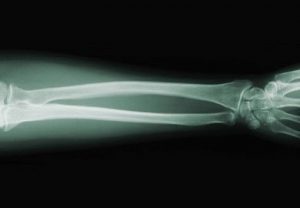Radiology and Radioactive Waste
Radioactive waste (nuclear medicine)
 Though radioactive waste is out of scope for these MnTAP webpages, it is important to note that radioactive wastes can and do occur in some hospital and clinical settings, especially in the form of radioactive liquids, capsules, or gases, usually administered in Nuclear Medicine departments. Radioactive materials are typically kept in a “hot lab” and are overseen by a designated Radiation Safety Officer. Nuclear Medicine departments have strict guidelines for personal protective equipment, patient safety, and safe disposal of radioactive waste. Disposal generally includes what is called “decaying,” which means the nuclear waste spends a designated amount of time stored in a lead-lined safety container so that it can “decay.”
Though radioactive waste is out of scope for these MnTAP webpages, it is important to note that radioactive wastes can and do occur in some hospital and clinical settings, especially in the form of radioactive liquids, capsules, or gases, usually administered in Nuclear Medicine departments. Radioactive materials are typically kept in a “hot lab” and are overseen by a designated Radiation Safety Officer. Nuclear Medicine departments have strict guidelines for personal protective equipment, patient safety, and safe disposal of radioactive waste. Disposal generally includes what is called “decaying,” which means the nuclear waste spends a designated amount of time stored in a lead-lined safety container so that it can “decay.”
Some resources you may want to consult about radioactive waste:
- American Association of Physics in Medicine published a booklet called Radiation Information for Hospital Personnel. Though it was published in 1995, it is still a useful tool to better understand the sources of and issues with radioactive waste in healthcare.
- Stanford Hospital created a Radiation Protection Guide for Hospital Staff in 2010, which can also be used as a learning tool for this topic.
- The International Commission on Radiological Protection (ICRP) offers free downloadable educational tools for hospital/healthcare-related radiation topics.
- The National Council on Radiation Protection & Measurements (NCRPM) offers oversight and information related to Radiation Protection in Medicine.
Radiology/Imaging Waste
Radiology departments generate waste not typically found elsewhere in healthcare. Though the rise of digital technology in imaging departments has grown to be the norm in Minnesota, there still may be locations that use more traditional forms of imaging technology, including the use of developers, fixers, and films.
 Radiology Films
Radiology Films
You must use a universal waste disposal company or silver reclamation company to dispose of radiology films; either will gladly accept this waste from you. Even if you have already switched to digital imaging, it is useful to have a company identified for clean-outs of old radiology films. This disposal must be tracked and reported in your annual hazardous waste license renewals (for more on the topic of hazardous waste licensing, visit our healthcare hazardous waste webpage).
Fixers and Developers
Used developer can be disposed of down a drain that is connected to a publicly owned treatment works (POTW); however, you must notify the POTW. If your facility is not connected to a POTW (meaning, if you use a septic system), you must ship the used developer from your site for disposal as hazardous waste. Universal waste disposal companies or silver reclamation companies will reclaim silver from used fixer. Installing a silver recovery unit at the end of the x-ray processing unit is an option for disposing of used x-ray fixer. Recovered silver can be sold to a metal reclaimer, and treated fixer can be disposed of down a drain that is connected to a wastewater treatment plant. Your POTW must be notified of all discharges to the sewer. If you are connected to a septic system, do not dispose of treated fixer down the drain.
Radiological Contrast Media
Radiological contrast media (not ingested) may be hazardous waste, especially if it contains barium. There are many contrast media products that are not considered hazardous waste, and it may be worth consulting with your hazardous waste disposal company to see what they know about this topic. You may also want to consult with other imaging groups in your area to see if they have had success with non-hazardous contrast media. Note that ingested contrast media is not regulated under waste laws.
Lead vests
Lead vests occasionally need to be replaced, and the outdated vests must be disposed of. Generally, a universal waste disposal company can accept lead vests for recycling. For more information on lead recycling, visit our healthcare universal waste webpage.